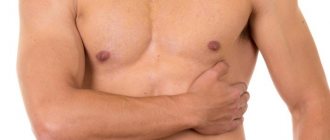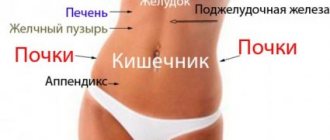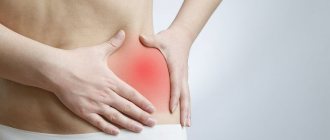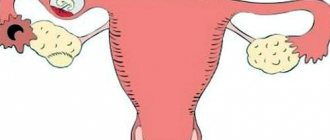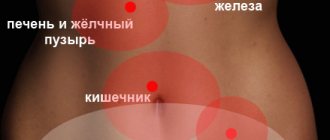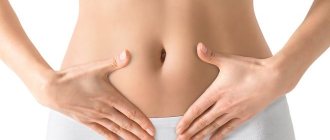Every mother expecting the birth of her baby reacts sharply to any signs of discomfort or pain, and closely monitors how the pregnancy progresses. In case of any problems, she looks for an answer to the question, consulting with friends, mother, sister.
Often expectant mothers complain of abdominal pain. And often it is not at all related to pregnancy. The abdominal cavity contains internal organs, and without consulting a specialist, it is difficult to understand the cause of pain. But in no case should you ignore any discomfort, regardless of the nature of its origin.
Why does the left side hurt during early and late pregnancy?
In the early stages of pregnancy, pain in the left side of the abdomen can be caused by the growth of the uterus. Another reason for pain in the lower abdomen in the early stages may be an ectopic pregnancy or a threatened miscarriage. In this case, the doctor prescribes a drug to the patient that helps reduce the tone of the uterus.
Another possible cause of pain in pregnant women on the left side may be a hernia of the diaphragm.
If you feel a spasm in this side of the abdomen in the later stages, this does not mean that there is a threat of miscarriage. Such signs can occur when the abdominal muscles are overstrained during physical activity or fast walking. You should not worry, rather relax and rest, do not overload your body.
At later stages of pregnancy, due to the constantly growing fetus, the intestines may move to the side, which can also cause discomfort in the abdomen on the left. In addition, pregnancy hormones have a relaxing effect on the muscles of the intestines and uterus, as a result of which peristalsis is disrupted. This causes the formation of stagnation of food in the intestines, which provokes pain. It is important to pay attention to your diet, diversify your diet with “light” dishes, vegetables and fruits. Limit your consumption of “heavy” foods. Divide your portion into small parts, eat more often, but in small portions. Also exclude carbonated water from your diet to avoid gas formation in the intestines.
What to do if the left side of your abdomen hurts
It is important to remember that the expectant mother is responsible not only for her own health, but also for the health of the unborn baby.
If you experience abdominal discomfort of any kind that does not stop for 30 minutes or more, you must urgently call an ambulance.
You should be examined not only by a gynecologist, but by a gastroenterologist and even an infectious disease specialist. The cause of the disease can be different. Only consultation with a competent specialist will protect you and your child from unwanted consequences.
Especially for - Elena Semenova
Many pregnant women experience pain in the left side. Is it possible to ignore this symptom or immediately go to the doctor? It all depends on the nature of the pain; if the pain is sharp or cutting, you need to go to a specialist. The causes and location of pain may vary.
Pain in the upper abdomen
To accurately determine the risk of illness in a pregnant woman, it is necessary to visually divide the stomach into squares. Pain in the right side above may mean that there is an inflammatory process in the gallbladder, liver, intestines or on the right side of the diaphragm. With symptoms such as nausea, vomiting, profuse sweating, the specialist pays special attention to the pancreas. Since the pancreas is responsible for many very important processes in the body, especially for the production of the hormone insulin, which is extremely important for the body of a pregnant woman, the doctor removes additional stress from this organ. Such inflammation can lead to various pathologies and complications during childbirth. After proper treatment, the pain in the right side stops.
Often pregnant women have pain on their left side. What could this mean? First, it is necessary for the patient to accurately show the location of the pain; it is necessary to conduct a detailed survey of how the pain is characterized? Colitis or tugging, does it only hurt on the left side or has the pain spread to the right?
If localization occurs in the upper left side, then first of all there is a suspicion of an inflammatory process in the spleen, since this organ, located quite close to the surface of the body, is more traumatic and susceptible to negative influences. It is responsible for removing red blood cells from the blood. This organ has been practically unstudied and is therefore unpredictable. And importantly, the spleen is responsible for producing blood in the fetus. If it doesn't work properly, it can cause developmental defects in the child. Inflammation of this organ does not occur on its own, but as a consequence of inflammatory processes in nearby organs. The spleen itself can become inflamed due to allergic reactions of the body.
Pain in the left side can also signal stomach diseases, such as gastritis, but we should not forget about more terrible diseases, stomach ulcers and, no matter how terrible it is to think about it, cancer.
Along with the above diseases, the symptoms of which in pregnant women are pain in the left and right side, there is also a rather rare disease - diaphragmatic hernia. In another way, this disease can be called a hiatal hernia. This hernia occurs for a number of reasons, such as overeating, chronic cough, obesity.
The symptoms of this disease are so similar to those of other diseases that it is often very difficult to diagnose it correctly. Pregnant women are sometimes bothered by the right side, but in most cases, the pain is on the left. If all examinations are carried out correctly and such a diagnosis is established for a pregnant woman, then she is prescribed a special diet.
It is strictly forbidden to consume sour drinks, smoked foods, fresh bread, fermented milk products, peas, and carbonated drinks. You should not eat large portions, as overeating provokes this disease. You need to eat little, but often. Immediately after eating, you should not take a horizontal position. Under no circumstances should you be constipated. Drinking special mineral water and following the recommendations described above is all that the doctor prescribes for a diaphragmatic hernia.
It happens that a pregnant woman is bothered by pain in the lower right side; it is worth paying special attention to this symptom, since not only appendicitis manifests itself in this way. Sexually transmitted infections, tumors and cysts can also cause pain in this area. With an ectopic pregnancy, in the early stages, pain in the right side is also noted.
In pregnant women, it hurts in the lower left side for the same reasons that the right side hurts. Pregnant patients may complain that the left side not only hurts, but also colitis. The only difference between the left and right sides in this regard is that with pain in the left side, appendicitis can be completely ruled out.
The uterus of a pregnant woman grows and enlarges, putting pressure on all organs, which can disrupt the process of bile separation. This phenomenon is called biliary dyskinesia. This is a disease that cannot be called harmless, since due to the inflammatory process gallstones can form. To prevent a miscarriage, the body of a pregnant woman produces a hormone such as progesterone in large quantities; it is this hormone that relaxes the uterus along with other organs, including the gallbladder. The work of this organ is disrupted and bile stagnates. With proper ultrasound diagnosis, this disease is easily detected and treatable.
In very early stages of pregnancy, pain in both the right and left sides can be a harbinger of miscarriage, so special attention should be paid to them at the beginning of pregnancy. Also, a growing uterus can cause pain in the left and right sides, this is absolutely not dangerous. But only a doctor can identify the real cause of these pains in women in an interesting position.
Inflammation of the kidneys - pyelonephritis
Very often, women are faced with the problem of kidney disease - pyelonephritis. This is a common disease that appears as a result of neglected cystitis.
Young ladies in search of their soul mates strive to look beautiful in any weather.
If a woman was careless about catching a cold in the genitourinary system, and then treated it incorrectly or even left everything to chance, then during pregnancy this will definitely remind itself of itself.
With pyelonephritis, the left side hurts. In this case, the pain will definitely radiate to the back of the body.
Under no circumstances should you self-medicate. The doctor must diagnose and prescribe appropriate treatment.
For diagnosis, you will definitely need to take a general and Nechepurenko urine test, as well as an ultrasound of the kidneys.
The main problem is that many drugs for the treatment of pyelonephritis are not suitable for pregnant women. Only a doctor can prescribe antibiotics.
In this case, all features of the course and progression of the disease are taken into account.
The basis of treatment includes less harmless drugs. Herbal medicines are often prescribed. Most likely they will offer you to drink kidney tea.
Nitroxoline helps well with kidney problems and has a small list of contraindications.
Reasons to consider
Pregnant women, especially older women, often suffer from high blood pressure; this can also cause pain in the left side, since pressure is exerted on the venous system, which radiates pain to the left side.
The most interesting reason for pain in the left side of pregnant women in the later stages is that the child is quite large and developed and is quite active in the womb. Pressing an arm or leg into this part of the abdomen can cause pain, both minor and quite intense. In order to rid herself of these unpleasant sensations, the expectant mother should calm down and gently ask her baby to remove the arm or leg. Usually this method is quite effective, because the connection between the child and the mother is quite strong.
Infections of the genitourinary organs and tract can also cause pain in the left side. Infections such as cytomegalovirus or chlamydia can seriously harm the fetus. A pregnant woman who receives a test with such a diagnosis should not despair. Timely administration of medications that kill these viruses will help you feel better and be completely healthy.
Pregnant women need to carefully monitor the manifestations of any pain and find out its cause in time, then they can expect that the born baby will be healthy. Modern medical institutions monitor expectant mothers with special care. Highly efficient equipment, highly qualified specialists, carrying out analyzes with great accuracy, all this gives confidence to our women and helps them feel safe.
Most often, pain on the left side during pregnancy is caused by the growth of the uterus, fetus or hormonal changes. This causes discomfort, but does not have serious health consequences.
Common reasons include:
- Spasms
Sometimes, shortly after ovulation, during which conception occurred, cramps occur. They last 1-2 days, during which a small brown discharge or light bleeding may appear.
- Gas, bloating, constipation
During pregnancy, hormones are released that slow down digestion. Also, due to the growth of the uterus, pressure on the intestines increases, which leads to gas formation, bloating and constipation. Sometimes prenatal vitamins and iron supplements can cause constipation.
- Round ligament sprain
The round ligament is one of those that surrounds and supports the uterus during pregnancy (it connects the front of the uterus to the groin area). The ligament usually stretches and relaxes slowly, so the growth of the uterus and the associated sprain of the ligaments, as well as any rapid movements (sneezing, coughing) can cause a sharp or prolonged dull pain in the lower abdomen, sometimes on the left side. This pain is observed in the second trimester of pregnancy.
- Braxton Hicks contractions
They are a common cause of pain from mid-pregnancy to 37 weeks. These contractions (also called “false contractions”) are caused by tension in the muscles of the uterus that do not dilate the cervix. They are often painless, but may cause some discomfort in the lower left abdominal area. Unlike regular contractions, Braxton Hicks contractions are rare.
How to relieve pain
There are several simple remedies you can use to relieve pain:
- Drink plenty of fluids (lack of fluid or dehydration can lead to Braxton Hicks contractions).
- Change your body position. Sometimes a more comfortable body position can help relieve pain.
- Change your diet.
Adding fiber to your diet, eating smaller meals and special exercises will help you fight constipation. You can also consult your doctor about using safe laxatives.
Massage not only helps reduce pain, but also calms the nerves and relaxes the body.
Warmth – A warm bath, heating pad, or hot water bottle can help with abdominal pain.
Pain in the left side as a cause for concern
Causes of pain on the left side that are dangerous for pregnancy and require immediate medical treatment:
Ectopic pregnancy
Early in pregnancy, the cause of pain on the left side may be an ectopic pregnancy, which occurs when the fertilized egg does not implant in the uterus. If treated incorrectly and untimely, this condition threatens the life of the woman and child.
Symptoms of ectopic pregnancy:
pain in the abdominal or pelvic area that increases during sudden activities, bowel movements, or even coughing, as well as red or brown bleeding.
Ovarian cysts
Ovarian cysts are quite common and usually do not cause any harm to the fetus or the woman. But it is important to control the size of the cysts, as large formations can cause pressure on the lower abdomen. If the cyst is large or twisted, your doctor may decide to remove it.
Signs and symptoms of ovarian cysts:
Similar to pregnancy symptoms - nausea, vomiting, pain and bloating, so doctors are especially careful to monitor women who present with these symptoms.
Miscarriage
If a pregnancy is terminated in the first 20 weeks, it is called a miscarriage.
Signs of miscarriage:
bleeding, heavy or light, cramping, usually starting soon after bleeding. Sharp pain in the lower back or pressure in the pelvic area may occur.
Premature birth
Begins before 37 weeks of pregnancy.
Signs
– unusual pain in the lower back, cramps or pain in the abdomen, uterine contractions occurring 4 or more times in 1 hour, bleeding or discharge that is different from normal - watery, with mucus or blood.
Preeclampsia
Preeclampsia is a complex disease of pregnancy that occurs after 20 weeks.
Symptoms
- include high blood pressure and protein in the urine. With mild preeclampsia, a woman may experience swelling due to fluid retention, which leads to increased weight gain. Severe preeclampsia causes headaches, blurred vision, fatigue, nausea, vomiting, and severe abdominal pain.
Try adjusting your diet for side pain
Urinary tract infections
Possible symptoms of the disease include pain in the pelvic area, usually above the pubic bone, bloody urine, often with a strange, unpleasant odor, and frequent urination. Untreated infection can lead to kidney infection or premature birth. If a urinary tract infection spreads to the kidneys, you experience pain in the lower back or side, a fever, nausea and vomiting, and there is pus or blood in the urine.
Placental abruption
An extremely life-threatening condition that occurs when the placenta separates, partially or completely, from the uterus before birth. Bleeding may occur, but in some cases there is no bleeding until the water breaks. In this case, the amniotic fluid will be mixed with blood. Bleeding may be accompanied by soreness of the uterus, decreased fetal mobility, and back pain. Immediate medical intervention is required.
Other reasons
There are factors for pain in the left side that are not directly related to pregnancy, but require special treatment:
- food poisoning;
- appendicitis;
- intestinal flu;
- hepatitis;
- sand and kidney stones;
- pancreatitis;
- gallbladder diseases and stones in it;
- uterine fibroids;
- intestinal obstruction;
- diaphragmatic hernia.
Pregnancy is a serious test for the female body. The load on all organs increases as the fetus develops, affecting the well-being of the expectant mother. Often during pregnancy, health problems that did not bother you before make themselves known. Thus, toxicosis and hypertonicity may be accompanied by pain in the left or right side. What could this be connected with and how could it affect the future baby? To find out whether pain in the side is dangerous for your health, you need to understand why it occurs.
Other causes of discomfort in the left abdomen
The status of pregnancy, however, does not mean at all that all the unpleasant sensations that arise in the abdominal cavity are caused by the work of the uterus, hormonal influences and other factors. The expectant mother is a person like everyone else, and she can also have diseases and pathological conditions that are completely unrelated to bearing a child. The most common of them:
- Intestinal infections with predominant damage to the final sections of the large intestine (shigellosis, amoebiasis, balantidiasis, salmonellosis and others).
- Diverticulitis.
- Acute appendicitis (yes, in some people the appendix is located on the left side of the abdomen).
- Ulcerative colitis and Crohn's disease.
- Renal colic due to urolithiasis.
Variants of location of the appendix
Pain on the left side of the abdomen with these diseases immediately attracts attention. It is usually strong, occurs either suddenly or within 1-2 hours, and is accompanied by other alarming symptoms:
- Liquid stool.
- The appearance of foreign impurities in the stool - blood, pus, mucus.
- Painful sensations in the perineum, especially in the rectal area.
- Increased body temperature.
- Tension of the muscles of the anterior abdominal wall (“stomach like a board”).
- A decrease in the volume of urine or the appearance of blood in it.
- Pain in muscles and joints.
In the overwhelming majority of cases, the appearance of these symptoms indicates that a pregnant woman has a stomach ache on the left side for some “internal” reasons not related to pregnancy.
Causes of pain in the left side during pregnancy
Any pain symptom in the body during pregnancy is an indication to consult a doctor. Often the discomfort that occurs goes away on its own, but it may also indicate the presence of serious illnesses. Pain in the lower left side of the abdomen and under the ribs can be caused by:
- physiological processes that are the body’s reaction to pregnancy;
- pathological problems associated with the presence of any disease.
Physiological pain is determined by the structure of the body. During pregnancy, hormonal levels change dramatically, and all systems and organs work hard to preserve the developing fetus.
At the same time, changes occur in the digestion process, blood flow in the pelvic area increases in order to supply the growing uterus and placenta with all the necessary substances. The muscles in the pelvic area relax and tighten under the influence of hormones, often causing stretching or tingling in the lower abdomen (more details in the article:). The causes of pain caused by physiological processes may differ and depend on the trimester.
1st trimester
In the first trimester, a woman's hormonal levels are controlled by progesterone, called the pregnancy hormone. Under its influence, muscle tissue and ligaments become more elastic, and the uterus stretches, providing growth and protection to the fetus. The process may cause short-term pain, which usually goes away on its own.
Another cause of pain in the left side in the early stages may be changes in the digestive system. Under the influence of progesterone, the process of food digestion slows down, gas formation increases, and constipation often begins. These troubles entail the appearance of pain, tingling or heaviness.
The left side hurts during pregnancy and due to the onset of hypertension, which is also caused by the onset of hormonal changes and an enlarged uterus. In any of these cases, you should not panic, but report your condition to a gynecologist who will conduct an examination and prescribe the necessary therapy.
2nd trimester
In the second half of pregnancy, the fetus continues to grow, the uterus quickly enlarges, affecting nearby organs. Painful sensations have natural causes and are caused by:
- increased blood flow in the spleen, which often cannot cope with its work due to hormonal load;
- compression of the left ureter, which causes fluid retention in it with subsequent stagnation in the kidneys;
- pressure on the intestines and stomach, which causes constipation, flatulence and colic;
- increasing activity of fetal movements, which become more noticeable compared to the early stages.
For the successful development and birth of a child, the expectant mother should pay increased attention to emerging symptoms. It is vitally important to listen to yourself and follow your doctor’s recommendations.
3rd trimester
In later stages of pregnancy, the uterus further compresses and displaces organs, thereby causing pain in the left or right side (we recommend reading:). Tingling and stretching may be observed. In the later stages:
- The weight of the woman and her unborn child increases, placing additional stress on the spine. At the same time, it pulls in the back area (we recommend reading:). The situation is aggravated during multiple pregnancies.
- The enlarged uterus puts pressure on the diaphragm, sometimes leading to a diaphragmatic hernia. The diaphragm muscles weaken, causing left-sided abdominal pain.
- The intestinal loops are displaced. Improper nutrition for a pregnant woman leads to stomach pain or pain in the side.
- Contractions begin and labor begins, accompanied by pain in the pelvic area. The baby is fully formed and ready to be born.
Causes and nature of painful discomfort in the left side
Can my left side hurt due to pregnancy itself? Of course, there are enough reasons for discomfort without pathologies of internal organs.
In the first trimester
Quite often in the first trimester of pregnancy, the left side feels tight, which is explained by endocrine changes. The pregnancy hormone, progesterone, has a relaxing effect on the muscles of the pelvic and digestive organs. The uterus begins to stretch, and a nagging pain occurs that is short-term in nature.
However, if it is accompanied by bloody discharge, then this is a dangerous symptom that may indicate a lack of progesterone and the threat of miscarriage!
In the early stages, you must warn your doctor about any abdominal pain!
In the second trimester
The second trimester is a time of intensive development of the baby, and this affects the condition of the expectant mother. The growth of the uterus causes increased pressure on the bladder and intestines, which fully explains the pain in the lower left abdomen. Due to the increase in circulating blood, the spleen also experiences stress. It increases in size and may from time to time remind itself of pain.
Pathological causes
Dear reader!
This article talks about typical ways to solve your issues, but each case is unique! If you want to know how to solve your particular problem, ask your question. It's fast and free
!
Pain is a sign of not only natural processes in the body. She often reports the presence of diseases that worsen during pregnancy.
Pathology can be identified based on tests, which is why it is so important to seek help from a specialist in a timely manner. The picture of pathological causes is very different from physiological ones (see table):
The presence of symptoms characteristic of pathology is always a reason to immediately consult a doctor. Severe pain can be caused by:
- the development of pregnancy outside the uterus, in the left tube or in the ovary, often accompanied by bleeding;
- ruptures of the left ovarian cyst (pulling and increasing pain);
- beginning miscarriage or placental abruption;
- isthmic-cervical insufficiency, in which the internal os of the cervix weakens, causing its premature opening;
- hypertonicity of the uterus;
- exacerbation of chronic gastritis or pancreatitis, diseases of the spleen, bladder, kidneys and other organs;
- developing infection in a woman’s body;
- appendicitis, acute colitis or volvulus;
- the beginning of labor.
Pathological changes require immediate treatment. When the first alarming symptoms appear, you should not hope that the pain will go away on its own.
Spleen problems and hiatal hernia
The growth of the uterus and changes in a woman’s body can also affect the spleen. This is very dangerous, especially if it ruptures. In this case, a blue color appears on the skin.
Impaired functioning of the spleen increases its size and changes its structure. This condition increases the risk of injury.
A diaphragmatic hernia is an equally serious disease. It is located in the upper abdomen, as if dividing the abdomen from the chest, having a small passage for the esophagus.
When the diaphragm muscles weaken, part of the stomach can become trapped in the chest area.
Pain during pregnancy in the upper part can be caused by this particular problem. Unpleasant sensations arise due to the release of acid.
At the first such sensation, you should immediately seek advice from your doctor.
In what cases is it necessary to immediately consult a doctor?
The pain can be pulling, cramping, stabbing or aching. Many of these symptoms are extremely dangerous for a pregnant woman and her unborn child. Contact your doctor or call an ambulance immediately if:
- pain in the left or right side has become unbearable;
- severe stabbing pain appeared in the left abdomen;
- body temperature has increased;
- Bleeding, diarrhea, etc. began.
In such cases, the woman needs medical supervision and treatment. The consequences of failing to see a doctor in a timely manner can be very serious, since such conditions threaten the life and health of the child and the woman herself.
Pain relievers
When pain symptoms begin, the first thing to do is lie down and relax, give the body a little rest. To relieve spasms, you can take an antispasmodic tablet that is not contraindicated during pregnancy (for example, No-shpa).
If the pain is severe, then before the emergency doctor arrives, you should lie on your side and bend your knees; this will help reduce tone and reduce the intensity of attacks. It is strictly forbidden if you have pain in the lower abdomen during pregnancy:
- put a warm heating pad on your stomach;
- take medications (antibiotics, painkillers, etc.) without consulting a doctor;
- drink laxatives and do enemas to cleanse the intestines.
Traditional medicine, for example, infusions of chamomile, calendula or lingonberry leaf, can also help in such a situation. However, they should be consumed only after consulting a doctor.
Starting from the second trimester, when the belly is already quite noticeable, the doctor prescribes wearing a special bandage that reduces the load on the spine. Thanks to this device, the load on the back and the pressure on the woman’s internal organs are reduced.
The bandage is worn during the day, especially with an active lifestyle. It should be removed at night. If your stomach hurts for a long time, tingles or aches, the pain intensifies and additional symptoms are added to it, do not self-medicate.
During pregnancy, pain in the left lower abdomen
In the early stages, the expectant mother's level of progesterone increases, which affects the speed of digestion, causing discomfort and intestinal upset. The accumulation of gases and constipation greatly affects the internal organs, so that the pain recurs. both right and left. Pain happens:
- Pulling;
- Cutting;
- Stabbing;
- Frequent and periodic.
Only competent specialists will be able to make an accurate diagnosis, decide on therapy and decide whether urgent hospitalization is required or whether it is enough to remain in bed and take painkillers. If during pregnancy there is pain in the lower abdomen, self-medication is excluded.
Depending on how often the spasm or colic recurs, how intense it is and whether the pain affects the woman’s general condition (fever, vomiting, diarrhea, bleeding), one can judge the seriousness of the situation and its consequences. In any case, urgent consultation with a therapist, surgeon and gynecologist is required. The level of competence and experience of these specialists guarantees the opportunity to keep the desired child.
Prevention measures
Prevention is always better than cure. A common cause of discomfort in the left side is digestive problems and poor nutrition, so to improve your well-being, you should review your food intake, include more easily digestible foods, vegetables, fruits in your diet, and eliminate fatty and heavy foods. A pregnant woman needs to move more, walk in the fresh air and be attentive to her health and its changes.
You need to start taking care of the well-being of your unborn child with early registration at the antenatal clinic. It is important from the very beginning to be under the constant supervision of a gynecologist, to undergo all prescribed examinations, ultrasounds and tests on time. Timely diagnosis helps to identify existing problems before they begin to threaten the expectant mother and her baby.
During pregnancy, significant changes occur in the expectant mother's body. Blood flow to the pelvic organs increases, individual muscle groups relax, and the hormonal balance is completely rebuilt. Such changes cause a feeling of discomfort and cause pain.
On the left side of the abdomen
There are such important organs as:
- stomach;
- diaphragm;
- spleen;
- intestines;
- uterus and left ovary;
- pancreas.
Deviations in the functioning of all of these organs can provoke pain in the left side during pregnancy. However, it can be physiological in nature or be a symptom of serious internal diseases.
Physiological reasons
the occurrence of pain are:
To eliminate discomfort, you should give preference to easily digestible foods
. It is necessary to take small portions and drink enough liquid.
A woman’s immune system weakens while raising a child, so during this period the body is especially vulnerable and can easily catch inflammation. And pain can become a symptom of such an inflammatory process. In this case we are already talking about pathology.
To pathological causes of pain
on the left side of the abdomen in pregnant women include:
Based on the signs of pain, you can determine the cause of its occurrence.
Pulling pain
indicates the following diseases:
- indigestion;
- neoplasms in the stomach;
- pyelonephritis;
- pneumonia;
- inflammation of the ovaries.
Stitching pains
appear due to:
- intestinal problems;
- spleen diseases;
- excess physical activity.
Acute and severe pain
sensations are associated with conditions such as:
- stomach ulcer;
- acute gastritis;
- strangulation of the stomach;
- colic of the digestive system;
- splenic rupture or cyst.
It is impossible to establish a diagnosis based on symptoms of pain. To identify the exact cause, it is necessary to conduct a diagnosis.
Diagnostic measures
for pain in the left side of the abdomen in pregnant women include:
- medical examination by palpation;
- conducting a general blood test;
- laboratory testing of liver enzymes, amylase and lipase;
- passing a general urine test;
- (ultrasonography).
Lower abdominal pain
The emerging situation can increase the load on the body and reveal hidden problems.
Pregnancy causes discomfort, some changes occur inside and sometimes the feeling of pain is quite natural.
Pregnancy is a responsible process and pain, especially in the abdominal area, should make a woman think twice and visit a gynecologist once again.
A woman should not ignore pain. Doctors must also monitor it under strict supervision.
The stomach is the main and special place where new life is born and nurtured. There are also many important organs around the baby.
They are the ones who can communicate the problem through pain. It is likely that the problems existed even before the start of pregnancy, and the interesting situation only provoked them to appear.
During pregnancy, there is a significant load on the entire body and especially on all nearby organs. The entire part of the abdomen can be roughly divided into 4 parts. The left side implies a division into bottom and top.
Often a woman cannot determine the exact location of the pain. The nature of the pain can be vague, sharp, aching or pulling.
Due to the blurred sensation, it seems that the entire left side hurts, but this is not the case.
Depending on the location of the pain, the cause of its occurrence is determined. Pain in the lower left side of the abdomen is most likely caused by intestinal problems.
Unpleasant sensations in the upper part of the left side are caused by disturbances in the functioning of the stomach, pancreas, and spleen.
Flatulence is a large formation of gases. Excessive gas formation causes:
- Stagnation of food in the intestines. This problem arises due to high pressure from the growing embryo.
- Wrong diet.
- Impaired intestinal motility. This is influenced by high levels of progesterone, which relaxes the muscles of the uterus and intestines.
Proper nutrition is one of the main conditions that must be observed.
You cannot overeat or go hungry; food intake should be frequent, but in small portions. The sample menu should be divided into 5-6 meals.
It is advisable to avoid foods that may cause gas. Nutrition should be balanced and full of vitamins.
Recommended for consumption: fermented milk products, vegetables, fruits, wholemeal bread, dried fruits.
The problem of gas formation cannot be ignored. Despite its harmlessness, flatulence can harm pregnancy.
In what cases should you urgently consult a doctor?
Any pain
, which appears during the period of bearing a child, is a reason to contact a gynecologist. It cannot be ignored or left unattended, as it may be a symptom of a serious illness.
Only a doctor will be able to determine whether pain is a physiological feature of pregnancy or is pathological in nature.
If the physiological nature of the pain is established, you can rest easy and you won’t have to worry in vain, which is so important for women preparing to become mothers. And if symptoms of pathology are detected, you may be referred to a gastroenterologist, therapist, infectious disease specialist or surgeon.
It is especially dangerous to ignore piercing, sharp and sudden pain that lasts more than 30 minutes. It may be symptoms of a ruptured spleen, ovary or fallopian tubes. You should consult a doctor immediately
if the pain is accompanied by fever, vomiting or.
What to do for pain in the left side
If the pain is physiological, you can take steps to relieve it at home. As a rule, simple and at the same time effective rules
allow you to quickly eliminate pain.
- . You should eat often, but in small portions. This will reduce the load on the stomach and improve digestion.
- It is necessary to include fresh vegetables and fruits, dairy products, dried fruits and wholemeal bread products in the diet.
- You should relax your muscles every day by taking a knee-elbow position. This exercise reduces pressure on internal organs.
- Gives the body strength and strengthens muscles.
- You need to rest more and walk in the fresh air.
If the pain is a pathology, the doctor will prescribe the necessary treatment
. The choice of drugs and the determination of the treatment regimen depend entirely on the cause of the pain. Most often, anti-inflammatory and painkillers are prescribed, which have no contraindications for use during pregnancy.
Pancreatitis
The pancreas can cause pain in the upper part during pregnancy. Inflammation of the pancreas is called pancreatitis. Pain in the left side, moving under the ribs, indicates the development of this disease.
The symptoms of pancreatitis are similar to toxicosis. Main signs: pain on the left side under the ribs, vomiting, nausea, fever, bloating.
Diagnosis is made using blood and urine tests. Only after determining the level of diastase, the doctor will prescribe treatment.
What not to do for pain in the left side
Forbidden:
- Take medications with analgesic, antispasmodic, and laxative effects.
- Apply a heating pad to your stomach.
- Do an enema.
The most important thing is not to self-medicate
. Even the most harmless drugs can cause side effects. Medicines are prescribed by a doctor who has weighed all the facts and assessed the condition of the pregnant woman.
Advice from experienced and competent specialists is always in demand. It is especially important to listen to them during pregnancy to prevent adverse consequences. So, if a woman is bothered by pain in her left side, doctors advise:
- It tightens and fixes the abdomen, thereby reducing the load on the organs of the digestive system.
- Accept . They improve immunity, and the body better fights inflammation and infections.
- . You should consume dairy products and limit starchy foods to avoid constipation. If the intestinal microflora is disturbed, bifidobacteria can be used. They are safe to take during pregnancy.
- Carry out specially designed .
Every woman can experience pain in the left side
, preparing to become a mother. The body undergoes a major restructuring, and all efforts are directed toward maintaining and developing pregnancy. Internal changes affect the functioning of organs and systems.
The growing belly puts pressure on the intestines, bladder, and props up the stomach. All this entails the appearance of pain. In such cases, they do not pose a danger and can be alleviated. But the risk of developing a serious illness cannot be ruled out. Therefore, if you experience pain in your left side, you should consult a doctor.
